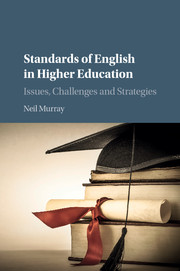Book contents
- Frontmatter
- Dedication
- Contents
- List of figures and tables
- Acknowledgements
- List of acronyms and abbreviations
- Introduction
- 1 The ‘English language question’ in the context of the changing face of higher education
- 2 English language: the need for and impact of policy and regulation
- 3 Seeking definitional clarity: what is ‘English language proficiency’?
- 4 Pre-enrolment language assessment and English language conditions of entry
- 5 Post-enrolment language assessment: challenges and opportunities
- 6 From assessment to provision
- 7 Innovation in English language provision: driving and navigating institutional change
- 8 Innovation in English language provision in higher education: an Australian case study
- References
- Appendices
- Index
8 - Innovation in English language provision in higher education: an Australian case study
Published online by Cambridge University Press: 05 November 2015
- Frontmatter
- Dedication
- Contents
- List of figures and tables
- Acknowledgements
- List of acronyms and abbreviations
- Introduction
- 1 The ‘English language question’ in the context of the changing face of higher education
- 2 English language: the need for and impact of policy and regulation
- 3 Seeking definitional clarity: what is ‘English language proficiency’?
- 4 Pre-enrolment language assessment and English language conditions of entry
- 5 Post-enrolment language assessment: challenges and opportunities
- 6 From assessment to provision
- 7 Innovation in English language provision: driving and navigating institutional change
- 8 Innovation in English language provision in higher education: an Australian case study
- References
- Appendices
- Index
Summary
Introduction
The purpose of this final chapter is to describe a case study which serves to illustrate, in concrete terms, many of the issues discussed in the foregoing chapters and which come into play when attempting to bring about institution-wide change in relation to the way in which the question of students’ English language competence is addressed by English-medium universities. The study focuses on a university in Australia which, eight years ago, sought to develop a strategy for addressing what I have referred to as ‘the English language question’; a strategy that would respond effectively to students’ English language needs and thereby help ensure that they would maximally fulfil their academic potential and be well placed to meet the requirements and expectations of employers. Such a strategy, while desirable in and of itself, was also seen as a necessary response to government-driven regulatory changes, discussed in detail in Chapter 2 and concerning English language provision within institutions of higher education. Most particularly, it was a response to AUQA's document titled Good Practice Principles for English language proficiency for international students in Australian universities, published in 2009, and to that of its successor English language standards for higher education, produced and released under the auspices of TEQSA. As we saw in Chapter 2, this document was heralded as the basis for future audits in respect of the calibre and adequacy of universities’ English language assessment processes and provision, with a view to ensuring that students entered their degree programmes with a level of language commensurate with the linguistic demands of their courses and with access to language development opportunities that would allow them to increase their communicative competence during their lifecycle as students. The Good Practice Principles document has been reinforced by recent revisions to the Educating Services for Overseas Students (ESOS) Act, designed to ensure that English language entry levels for commencing students are consistent and that institutions have adequate services in place to support students once enrolled.
In 2012, the university concerned finally introduced a whole-of-institution approach to English language proficiency in an effort to ensure that it succeeded in responding appropriately, creatively and systematically to students’ English language needs, and in doing so to the expectations articulated in these regulatory initiatives.
- Type
- Chapter
- Information
- Standards of English in Higher EducationIssues, Challenges and Strategies, pp. 201 - 230Publisher: Cambridge University PressPrint publication year: 2015



